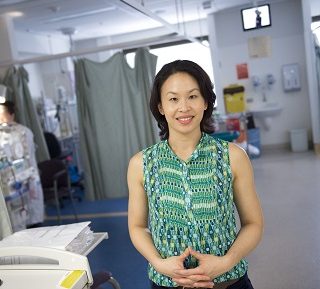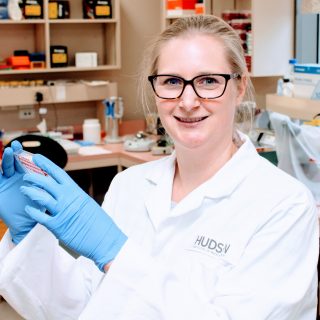News
Popular searches: Influenza, Childhood cancer, Endometriosis, Inflammation
-

Breathing life into patients with ‘irreversible’ lung disease
Lung fibrosis patients could soon inhale ‘droplets’ of tiny particles derived from stem-like cells found in the human placenta in an effort to repair ‘irreversible’ deadly scarring of the lungs, thanks to world-first research. The regenerative medicine treatment could one day form an alternative for patients with the disease who aren’t eligible for a life-saving… Read more
-

PhD research helping babies to breathe recognised with Royal Society prize
PhD student Aidan Kashyap, who is progressing research to help babies born with underdeveloped lungs, was awarded a Young Scientist Research Prize in Biomedical Sciences by the Royal Society of Victoria on 16 August. The awards recognise excellence in Victoria’s early career scientists. Prizes were open to Victorian students in their final year of PhD… Read more
-

Looks like a mouse, acts like a mouse … menstruates like a human
A species of desert mouse has a menstrual cycle that is more similar to women than previously thought, according to a new study by Hudson Institute of Medical Research scientists. The spiny mouse could be key to understanding why some women develop endometriosis and exceptionally heavy, painful periods. The findings of the study by Dr… Read more
-

Study to examine ‘first wave’ of IVF babies conceived using sperm microinjection
Can infertility be passed from father to son? A new study of young men born to hundreds of couples using sperm microinjection, the most common IVF technique, is aiming to answer that question.… Read more
-

NHMRC Fellowship success
Hudson Institute has had outstanding success in the recent National Health and Medical Research Council (NHMRC) Fellowship and Development Grant announcements.… Read more
-

Protein key to endometrial cancer spread identified
Scientists have uncovered a protein that could be responsible for endometrial cancer cells detaching from the womb and implanting elsewhere in the body – but a drug that is in development could help. Endometrial cancer is the most commonly diagnosed gynaecological cancer in Australian women, yet there is no early diagnostic test and limited treatment… Read more
-

NHMRC grant success – women’s health research
Federal Minister for Health, The Hon. Greg Hunt MP has announced $18 million in National Health and Medical Research Council (NHMRC) funding for women’s health research.… Read more
-

World-first trial of placental cell treatment helping premature babies
A world-first therapy, developed at Hudson Institute of Medical Research and Monash University, using cells from the human placenta to repair the damaged lungs of premature babies, is giving hope to families of the most fragile infants like Harry Campbell. The results of a clinical trial at the Monash Children’s Hospital – the culmination of… Read more
-

Ovarian cancer screening test underway for 300 patients
A clinical trial of a screening test developed by Hudson Institute scientist, Dr Andrew Stephens to detect ovarian cancer in its early stages is about to start in a large group of Victorian and South Australian women, thanks to funding from the Ovarian Cancer Research Foundation (OCRF). About 300 women will be recruited to the… Read more
-

Turbo-charging chemotherapy for lung cancer
A naturally occurring hormone could help make chemotherapy much more effective for many Australians with lung cancer, according to new findings from Sydney and Melbourne researchers. And the hormone – known as follistatin – also appears to prevent kidney damage, a serious side effect of chemotherapy. The promising new ‘two birds, one stone’ treatment approach, which was… Read more
